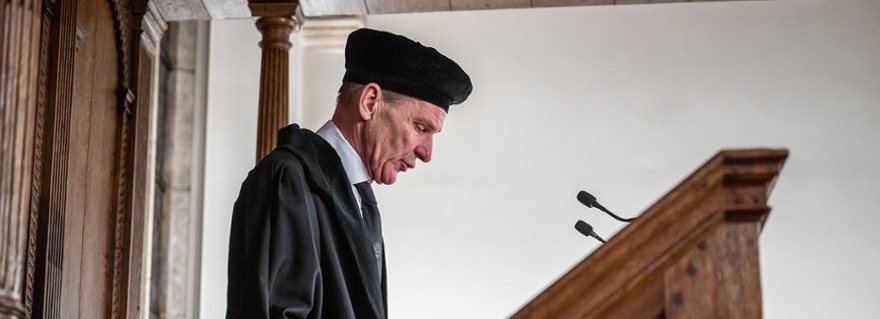Leiden University (Netherlands) Cleveringa Lecture By Gert Oostindie: Leiden University Should Also Reflect On Its Colonial History

It is crucial that Leiden University reflects on its colonial history. These were the words of Cleveringa Professor Gert Oostindie in his inaugural lecture on 24 November. ‘As a university community, we must dare to hold up a mirror to ourselves and, where possible and necessary, also take concrete steps.’
The hall was crowded and there was not a single empty seat when Rector Magnificus Hester Bijl opened the annual Cleveringa lecture. She reflected on the dilemmas associated with discussing emotional issues such as slavery and the decolonisation process. In these times of polarisation, Bijl said, it is important to strike a balance between the good and the less good aspects of the past. ‘In that light, we as a university are also very conscious, for example, of our collections and we take responsibility for them.’
Bijl also made it clear that, in the spirit of Cleveringa’s hard-fought freedom, it is the duty of Leiden University ‘to offer moral support to the courageous in this world’ in the ‘so very important fight for the freedom of us all.’ Bijl cited as current examples of great courage the war in Ukraine and the courageous fight for freedom there, and the brave demonstrations for freedom in Iran, which have met with a violent response.
Courage and disregard
‘What makes us consider a certain thing to be unjust?’ Gert Oostindie asked at the beginning of his inaugural lecture, ‘Courage and disregard’. He believes that injustice depends to some extent on the time, place and social position of a person or community. This ‘positionality’ can mean that one injustice is courageously fought whereas the other is completely disregarded. Oostindie stated that these two attitudes towards injustice are apparent in the Leiden professor Rudolph Pabus Cleveringa and Leiden University during the Second World War (in the Netherlands, 1940-1945) and Indonesia’s struggle for independence (1945-1950).
In his famous speech on 26 November 1940, Cleveringa bravely fought against the injustice wrought on his Jewish colleagues at Leiden University by the German occupiers. This, together with the courageous efforts of the students and staff who were in the resistance, made the University an institution that lived up to its motto of praesidium libertatis or bastion of freedom. At the same time, however, the injustice that the Netherlands itself perpetrated in the Dutch East Indies was a blind spot for both Cleveringa and the University, said Oostindie. ‘They disregarded the Indonesians’ legitimate desire for freedom and were strongly opposed to Indonesian independence.’
Blind spot
Oostindie went on to discuss this blind spot and Leiden University’s role in the colonial history of the Netherlands during the Second World War and the subsequent years of war in Indonesia. Oostindie commented, expressing some amazement, that no inaugural lecture has previously ever been devoted to questions surrounding Dutch colonialism, to Dutch responsibility, to Dutch culpability. This was despite the important role played by University and its community in maintaining the Dutch East Indies.
According to Oostindie, from 1900 onwards Leiden University was the training centre for civil servants from Dutch and Indonesian soil who would raise the Dutch East Indies to a higher level. Although the University was seen as progressive because of this approach, it also had great difficulty relinquishing ‘its’ East Indies when Indonesian nationalism developed into a fully-fledged movement.
Deep disappointment
A telling example is the attitude of Cleveringa and Leiden University towards the University’s Indonesian students. Indonesian students had been extremely active in the resistance against the Germans and two of them would even pay for this with their lives. Upon the liberation of the Netherlands, the Indonesians from Leiden did gain recognition for their efforts, ‘also from Cleveringa himself, who publicly expressed his appreciation in May 1945, in the Stadsgehoorzaal concert hall: “Where there was resistance here in the Netherlands, we did not need to ask: Where are the Indonesians? They were here and at their posts. They made their sacrifices. They were in the concentration camps, they were in the prisons, they were everywhere.”’
But, said Oostindie sombrely, support for the wishes of these Indonesian students for an independent state failed to materialise. Most of the Indologists at Leiden University continued to think within colonial terms and there was little in the way of discussion about the war of independence. What is more, Cleveringa joined a reactionary group around the former Minister of Colonies, Charles Welter, which strongly opposed the government’s policy for being too weak. Cleveringa therefore agreed with the colonial war in Indonesia and fell in line with what most of the Dutch population – and in particular the Dutch elite – thought. ‘All reason for deep disappointment, therefore, among Indonesians who had put their lives on the line here during the occupation.’
What next?
Oostindie finished his lecture by reflecting on how, now in 2022, Leiden University should confront its colonial legacy. It is essential we take responsibility, he said, and question an all-too-rosy self-image by discussing the less-positive aspects of the past: ‘We all carry a “cultural archive” with us, full of half-baked truths and prejudices that lead us once again to disregard others. This something we must face up to, and it is something the University can help new generations of students with – also by drawing links between apparently contradictory histories and remembrance cultures. As a university community we must dare to hold up a mirror to ourselves and, where possible and necessary, also take concrete steps. In teaching and research but, for example, also in critical reflection on the way in which Leiden’s colonial collections came about.’
